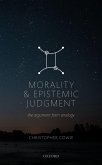In Morality by Degrees, Alastair Norcross articulates and defends a radical new approach to ethical theory. Consequentialist theories of the right connect the rightness and wrongness (and related notions) of actions with the intrinsic goodness and badness of states of affairs consequential on those actions. The most popular such theory is maximization, which is said to demand of agents that they maximize the good, that they do the best they can, at all times. Thus it may seem that consequentialist theories are overly demanding, and, relatedly, that they cannot accommodate the phenomenon of going above and beyond the demands of duty. However, a clear understanding of consequentialism leaves no room for a theory of the right, at least not at the fundamental level of the theory. A consequentialist theory, such as utilitarianism, is a theory of how to rank outcomes, and derivatively actions, which provides reasons for choosing some actions over others. It is thus a purely scalar theory, with no demands that certain actions be performed, and no fundamental classification of actions as right or wrong. However, such notions may have pragmatic benefits at the level of application, since many people find it easier to guide their conduct by simple commands, rather than to think in terms of reasons of varying strength to do one thing rather than another. A contextualist semantics for various terms, such as "right", "permissible", "harm", when combined with the scalar approach to consequentialism, allows for the expression of truth-apt propositions with sentences containing such terms.
Dieser Download kann aus rechtlichen Gründen nur mit Rechnungsadresse in A, B, BG, CY, CZ, D, DK, EW, E, FIN, F, GR, HR, H, IRL, I, LT, L, LR, M, NL, PL, P, R, S, SLO, SK ausgeliefert werden.









